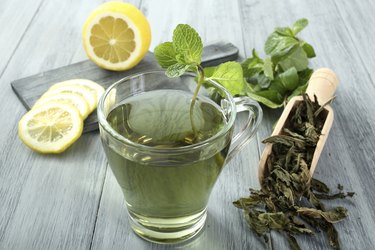
Lipton green tea is rich in antioxidants, vitamin C and a small kick of caffeine, making it a convenient choice for those who are on the go. But you can also prepare iced green tea at home to boost your antioxidant intake without the added sugar and preservatives.
Lipton Green Tea Ingredients
Video of the Day
Lipton green tea with citrus is a bottled beverage that has a sweet taste with a touch of citrus. Many consumers perceive it as a healthier alternative to soda or energy drinks.
Video of the Day
According to the Lipton green tea ingredients label, a 20-fluid-ounce serving provides 120 calories. It contains 180 milligrams of sodium, 32 grams of sugars and 144 milligrams of vitamin C. Its ingredients include:
- Water
- High-fructose corn syrup
- Citric acid
- Natural flavor
- Sodium polyphosphates (to protect flavor)
- Green tea
- Ascorbic acid (vitamin C)
- Potassium sorbate (preserves freshness)
- Phosphoric acid
- Sugar
- Acesulfame potassium
- Calcium disodium EDTA (to preserve the flavor)
- Honey
This beverage contains green tea along with high fructose corn syrup, sugar, honey and acesulfame potassium for sweetness. These sweeteners are also to blame for the added calories.
Sodium polyphosphates, potassium sorbate and calcium disodium EDTA are food preservatives that help maintain its flavor, freshness and flavor. Lipton also contains 26 milligrams of caffeine derived from green tea.
Read more: The Most Common Food Preservatives Explained
Benefits of Lipton Green Tea
There are many health benefits of green tea. This beverage contains natural antioxidants called polyphenols that are linked to a lower risk of cancer, diabetes and heart disease, according to Harvard Health Publishing.
Furthermore, a May 2018 study published in Molecules states that the antioxidants in green tea have the potential to prevent and treat neurodegenerative disorders, such as Alzheimer's and Parkinson's disease.
Lipton green tea boasts 26 milligrams of caffeine, which is enough to give you a small boost of energy without the jitters. When consumed in moderation, this stimulant may help improve concentration and focus, notes the Mayo Clinic.
The U.S. Food and Drug Administration states that healthy adults can have up to 400 milligrams of caffeine a day, making Lipton green tea a good choice if you're trying to cut down on stimulants. For reference, an 8-ounce cup of coffee has between 80 and 100 milligrams of caffeine.
Lipton green tea is also packed with vitamin C, an antioxidant that keeps your immune system strong and supports the body's ability to fight off germs and illnesses.
Lipton Green Tea Health Facts
Although Lipton green tea does provide some health benefits from green tea and vitamin C, it's high in sugar and high-fructose corn syrup. These sugars increase the calorie count and, at 120 calories per serving, calories can easily add up. Plus, this beverage contains preservatives and additives to extend its shelf life.
Lipton is a convenient drink to grab in a rush and it's slightly more nutritious than soda. However, you can easily make a refreshing green tea beverage that has all the antioxidant benefits without the added sugars and preservatives.
It's easy to prepare a healthier version of Lipton green tea at home. Brew green tea using tea bags steeped in boiling water for about an hour. Pour in an iced pitcher.
Use natural sweeteners, such as honey, coconut sugar or stevia, and squeeze some fresh lemon or lime for a citrus taste. If you make green tea using stevia, your beverage will have zero calories and no preservatives!
Read more: The Ultimate Guide to Natural Sweeteners
Green tea can be used in a variety of beverages, such as our delicious Blueberry, Cucumber and Green Tea Smoothie, which would make a perfect breakfast to grab as you're heading out the door. If you want the citrus taste but don't need caffeine, make fruit-infused water by soaking lemon or lime wedges in regular water or mineral water for a refreshing and calorie-free way to quench your thirst.
- Lipton: "Green Iced Tea Citrus"
- Pepsico: "Lipton Green Tea With Citrus"
- Harvard Health Publishingl: "Health Benefits Linked to Drinking Tea"
- Molecules: "Beneficial Effects of Green Tea Catechins on Neurodegenerative Diseases"
- U.S. Food and Drug Administration: "Spilling the Beans: How Much Caffeine Is Too Much?"
- Mayo Clinic: "Caffeine: How Much Is Too Much?"